Jan 29, 2026
Jan 29, 2026
Wanderer by Rajender Krishan
Paperback ISBN : 978-1-947403-15-4 Amazon ebook ASIN : B08T7VS8DZ
Available on Amazon USA | Amazon India
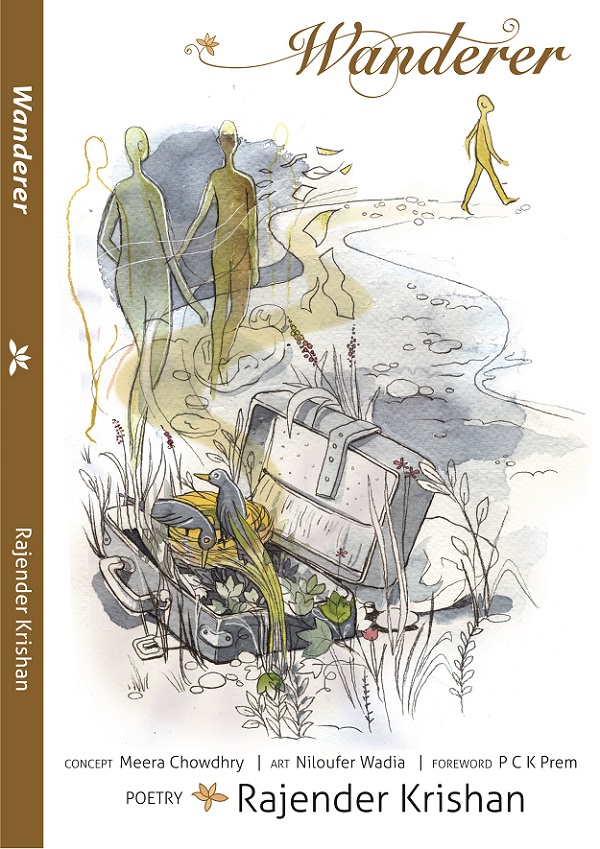 Wanderer is yet another significant contribution of the poet, author and entrepreneur Rajender Krishan in a quick succession after the recent release of his anthology of poems “Amma’s Gospel” in 2020. Many of his poems often have a deep philosophical contents and spiritual nuances, and his current collection of poems is no exception. To my mind, any honest and critical review of philosophical contents need thorough understanding, special skill, and clear vision. I am not too sure about my own such skills and abilities, but I do confess that the reading of his anthology of poems was indeed a pleasurable and fulfilling experience.
Wanderer is yet another significant contribution of the poet, author and entrepreneur Rajender Krishan in a quick succession after the recent release of his anthology of poems “Amma’s Gospel” in 2020. Many of his poems often have a deep philosophical contents and spiritual nuances, and his current collection of poems is no exception. To my mind, any honest and critical review of philosophical contents need thorough understanding, special skill, and clear vision. I am not too sure about my own such skills and abilities, but I do confess that the reading of his anthology of poems was indeed a pleasurable and fulfilling experience.
His recent anthology is so aptly christened as “Wanderer” as the poet himself admits in the preface that his mind oscillates between turmoil and calm, at times for no rhyme and reason, in search of a purpose, to understand the cause and to ascertain the destination. In literal sense, a wanderer is a person that travels around extensively rather than settling at one place, often setting own rules in the process deviating from the society’s norms. But here what the poet probably implies is the abstract wandering of soul over the spiritual and metaphysical aspects, people’s mundane lives, the karmic cycle and the actual purpose of life.
Ironically, the bygone year of 2020 has remained all along a period of extreme despair and hope for the future of mankind on account of the COVID-19 pandemic caused by the novel severe acute respiratory syndrome coronavirus 2 (SARS-Cov-2) and even the poet was not entirely free from the anxiety thus caused by the commotion, trauma and tragedies on humanity world over as reflected in many of his poems. The present anthology is comprised of precisely hundred poems reflecting various moods and attributes of the much enlightened and mature poet, who perhaps as Wanderer goes on to exploring philosophical concepts, spirituality and aspects of mundane life, in some places as a mere observer and at others as a wise pedagogue.
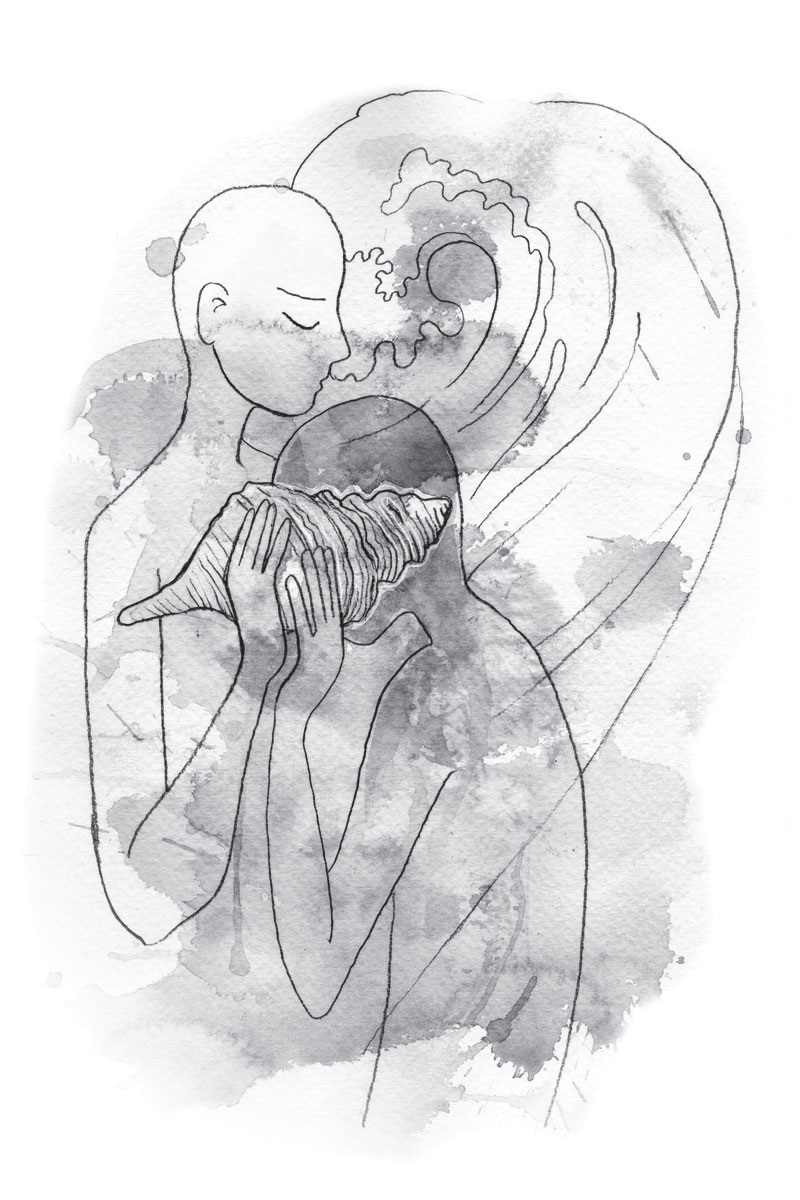 In the very first poem “Inexpressible”, the stated philosophical nuance is clearly visible when the Wanderer says:
In the very first poem “Inexpressible”, the stated philosophical nuance is clearly visible when the Wanderer says:
That what is inexpressible
is best to remain nestled
as the eternal witness…… … …
wonderful play
of cyclic life, should it even matter
who finds whom, next?
The verse is full of mysticism hinting towards the invisible and unexpressed master of the universe (God) and his play that further unfolds to a considerable extent in the opening lines of the next verse “View”, when the poet says…
That what is formless
is yet the only eternal form
Here obviously, the reference is to the almighty God, who is best described as Brahman in Hinduism. The poet implies that this formless (Brahman) is the only eternal truth in this universe, which many ignorant people search (worship) at home, in religious places, and in the nature while He rests inside and can be reached through self-realization. This truth is, however, known to the mystic who meditates in peace with eyes closed in complete harmony with the formless (God).
A mystic is usually understood as a person who directly experiences the Supreme Being, usually unmediated by conventional religious rites and rituals, or intermediaries, transcending established belief systems and after bypassing the intellect and ego. In Hinduism, Brahman is what we know as the Universal Consciousness, Supreme Soul, or the Supreme Self. Hindu scriptures describe Brahman (God) as absolute, eternal, indescribable, inexhaustible, incorporeal, omniscient, omnipresent, both transcendent and immanent, infinite existence, and the ultimate entity Who is without a beginning and end, and Who is the cause, source, material and effect of all creation known, unknown and yet to happen in the entire universe. He is both creator and created, known and unknown, with form and formless, and hidden in all.
The aforesaid mysticism and the consequent undulation between the Wanderer and Mystic thoughts and perceptions continues through many subsequent verses such as Mind, Conscience, Shadow, Opinion, Creativity, Debate, Transformation, Wonderful, Discourse, Cipher, Ennui, Matchless, Fulfilment, Tranquillity, Veracity, Outlook, Contentment, Fragrance, Sly, Wanderer, and so on, exploring various aspects of spirituality, including Self (soul), Gunas, Leela, bondage, karmic cycle, self-realization, liberation, and so on. It is not possible in a brief write up to individually address each and every aspect of this spiritual journey, but an attempt is made here to capture a few more glimpses in the following paragraphs.
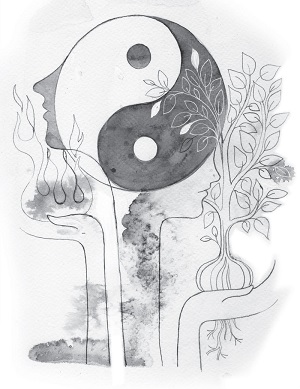 Beyond the physical attributes of the person, the human mind is the most complex and potent abstract organ as concluded by the poet in the following abstraction:
Beyond the physical attributes of the person, the human mind is the most complex and potent abstract organ as concluded by the poet in the following abstraction:
Is it plausible that the chaos caused,
due to the combination of elements,
the gunas, nature and the principles
of Life at large, is what manifests
camouflaged as the mind?
The poet visualizes the mind as the product of the grand cosmic design accommodating all opposing perspectives such as doubt or conviction, hesitancy or inclination, likes and dislikes, pull and push of strange influences, that also explains the inherent tussles leading to a conflict of nerves, and even causing hasty or indolent reactions. According to the Samkhya School of Hindu philosophy, the dual nature of life is on account of the two aspects of the physical reality i.e., the Purusha and Prakriti.
The Purusha is defined as the Self or the subject, who has awareness while Prakriti, on a much broader canvas, encompasses everything that is seen or known in the objective universe, including material and psychological. This unmanifest Prakriti is a pool of limitless potential comprising of three fundamental balancing forces called the gunas namely Sattva, Rajas, and Tamas. Prakriti manifests as the universe through the interplay of these forces and, accordingly, every tangible and intangible object, including human mind, known in the physical world is in reality a manifestation of the nature and principles of gunas in various concentrations, proportions and forms.
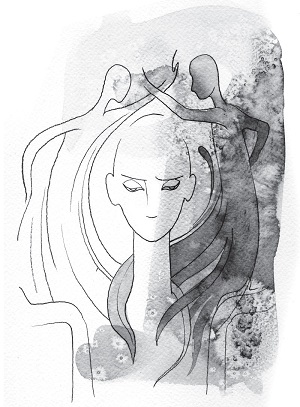 Then in the very next verse “Conscience”, the poet delves with the Self that has potential to transcends all dualities as revealed by the scriptures millennia ago whereby the mind is tamed to have an ethical and logical response to situations instead of a non-judicious and reckless reaction.
Then in the very next verse “Conscience”, the poet delves with the Self that has potential to transcends all dualities as revealed by the scriptures millennia ago whereby the mind is tamed to have an ethical and logical response to situations instead of a non-judicious and reckless reaction.
The scriptures have since eons
preached to conquer the mind,
to crush the reservation on how
for a logical and ethical response
rather than a reckless reaction.
According to Hindu scriptures, Individual Self or Atman is distinct from the manas (mind) and the sthula sarira (physical body). This Self (Atman) is the real entity without any name, gender, race, nationality or such other attributes, which passes through the karmic cycle in repeated births and deaths till it attains liberation (Moksha). According to Srimad Bhagavad Gita, the soul is neither born, nor it ever dies; the soul never ceases to exist as it is without birth, eternal, immortal, and ageless. It is not destroyed when the body is destroyed (Bhagavad Gita 2.20).
This soul always lives with the physical living being (body) to guide, advise, reprimand and show path of wisdom in good and bad times which is reflected in yet another verse “Shadow” as follows:
One wonders if there is a need
for anyone else to guide?
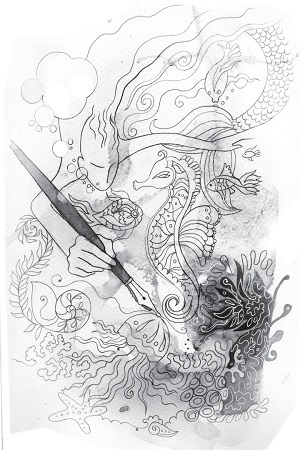 And then what more remains to be told about the poet’s in-depth spiritual knowledge and understanding as also its evocative revelation to the mundane world as expressed in the following lines of “Creativity”.
And then what more remains to be told about the poet’s in-depth spiritual knowledge and understanding as also its evocative revelation to the mundane world as expressed in the following lines of “Creativity”.
The invigorated poet dives in
the ocean of fantasy to reach
its very depths to witness
the unfolding of the marvel,
from one form to another
changing from grosser
to subtler to sublime layers;briefly, comes face to face
with what is the formless,
limitless and endless.
The aforesaid lines need no further explanation to any person of even average understanding and wisdom revealing the marvels of the creator and creation. In short, each such poem in this collection is a gem of wisdom and advice to be followed by everyone who has genuine desire of exploring or pursuing the philosophical and spiritual insight of the cosmos in their quest of unravelling the universal truth as revealed by the poet.
Life is a play…
So be the performer
understand the scenes
follow instructions
given by the director
In between these musings, the poet remembers the role of parents and more particularly the mother in creation and continuation of life in the physical universe. The poet laments in “Remembrance” that every living person so frantically searches mundane things and his worldly possessions as also tries to remember things which are forgotten with time but the very idea or the act of trying to remember the parents looks to inane when, despite their absence, they are actually part of our own being.
Image the One
… … …
as the mother;Not listening to
this sacred voice
or suppressing it
is self-deception,
being delusional,
and disrespectful
to the Creator
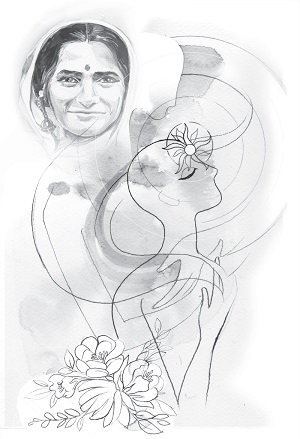 His poem “Mother” presents a simile with the role and importance of the mother in creation and nurturing of her offspring akin to the similar role of the Master of Universe in creation and sustenance. The aforesaid lines so meticulously reflect the value and importance of the mother in every living being’s life and Shri Rajender Krishan’s reverence and remembrance of own mother.
His poem “Mother” presents a simile with the role and importance of the mother in creation and nurturing of her offspring akin to the similar role of the Master of Universe in creation and sustenance. The aforesaid lines so meticulously reflect the value and importance of the mother in every living being’s life and Shri Rajender Krishan’s reverence and remembrance of own mother.
In Sly, the poet bluntly tells the fake devotees about the futileness of a prayer when the mind is not focused with many insincere and impure thoughts. Such people might blame the chosen deity for their failed mission but it’s obvious that the divine path is not for the selfish and greedy seekers.
Advising everyone of good action
flowered with expressive speech,
Talk not of doctrines or morality
if practicing not, what you preach
As Wanderer, the poet wishes to achieve equanimity of mind in preparation of his final journey. He desires to get rid of the worldly cravings to walk on his chosen path because he understands that this journey to unknown must commence unsullied without any baggage (on soul) to reach destination (liberation). He nigh well understands the transient nature of the life around and material possessions; hence he seeks the blessings of the divine to be true to himself (Self).
The new journey
must begin, unsullied,
without any luggage,
to explore the unknown
While exploring deep into philosophical and spiritual domain, the poet ventures into a variety of other aspects related to the mundane human life. Several poems such as Schooling, Learning Matters, Learning, Elementary, Presumptions, Karma, Duty, Candor, Contrast, Accord, Dawn, Cognition, Naissance, Perfection, Fire of Life, etc., represent poet’s such musings. It is not possible to include everything in a limited gamut but a few of them are illustrated here without undermining the value and relevance of others.
The “Schooling” is one such brilliant verse that summarizes how life, by default, teaches and prepares a soul to learn to live through various challenges and tough times aptly making use of the attributes like gratitude, aptitude and fortitude while aiming for the commensurate altitude in life. In the process, what is ephemeral, inexorable and irreversible that must be accepted with grace. One must also realize that the constant change is the inherent law of the nature that one should learn to live with it with harmony and peace. A person who lives to learn these lessons, finds life exciting, fulfilling and blissful, and finally departs contended.
… … …
And now in my twilight,She gracefully prepares me
to be ready for a new latitude
in the singularity of her solitude
These learnings of life continue through the poet’s subsequent verses “Learning Matters” and “Learning”. The former contains useful tips about the mentor and learner while the latter flags the learning tips and the default nemesis including its tough and strange ways.
When in doubt
worry not.… … …
Life teaches
in her own
mysterious ways.
No one is spared.
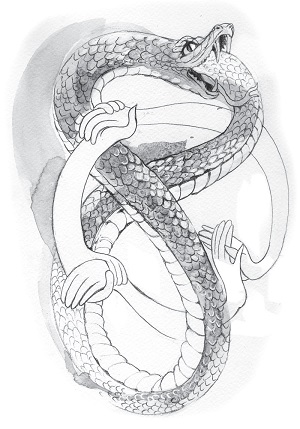 The principles of cause and effect is well explained in the verse “Karma” in a very simple and candid way. According to Karmic laws explained in scriptures, the transparent and fair acts accrue good and favourable outcome while illicit and corrupt practices ultimately return malice and pain to the doer. Hence it is for every subject to determine for self what he should do to achieve the intended outcome.
The principles of cause and effect is well explained in the verse “Karma” in a very simple and candid way. According to Karmic laws explained in scriptures, the transparent and fair acts accrue good and favourable outcome while illicit and corrupt practices ultimately return malice and pain to the doer. Hence it is for every subject to determine for self what he should do to achieve the intended outcome.
The Karmic principle
is indeed, candid, and blunt
Whichever way one deals
it rebounds with equal bruntFair and square transactions
garner goodwill and gain
Illicit and corrupt practices
trigger malice and pain…
In the aforesaid verse, the poet has tried to capture the concept of Karma (action and reaction) as described in Hindu scriptures, particularly the Srimad Bhagavad Gita. The nature of action is such that it can either bind one to this world or liberate one from it. By acting for the pleasure of the Supreme Soul (God), without selfish motives, one can achieve liberation from the karmic cycle by attaining transcendental knowledge of the Self and Supreme. The Karma-yoga is the most essential element for the harmony of the universe of which human beings are an important link with a definite role to play, and in the process even the divine is not spared of the principle of the cause and effect.
While aptly dealing with the spiritual and mundane aspects of the world and human life through umpteen verses, the poet tends to assume a higher pedestal commensurate with his wisdom and knowledge and tries to give worthy advice to the less knowledgeable and ignorant on many living aspects. Several poems such as Attitude, Acumen, Cue, Stimulus, Greed, Well-done, Approach, Ponder, Virtue, Choices, Ruling, Forgiveness, Fake, Pain, Failure, Routines, Management, Common Sense, Loser, Blind Love, and some others, would be categorized under this genre.
For instance, under “Attitude” the poet deals with a situation that precipitates unwittingly and then goes beyond control of the person’s normal reach and abilities. Here again considering the transient nature of the things and the fact that nothing is constant or permanent in the physical world, the wisdom says that the person should not act or react unwisely in unfavourable circumstances even if the things are not in control.
Unfavorable spell maybe,
yet it is not crass
remember steadily
that ‘this too shall pass’React not inanely
to make the situation dire…
The very next verse “Acumen” tells the people to be generous and forgetful towards grievances, sufferings, deceitfulness and hate experienced in life for own tranquil and peaceful mind. Yet another verse “Stimulus” flags various negative and positive stimuli like anger, fear, greed, calm, courage, contentment, love, etc., with advice to wisely choose commensurate response thereagainst. In “Approach”, the poet advises how people should conduct when confronted and caught in ambiguous and uncertain situation of contradictory forces.
First and foremost,
fear not the conflicts,
rather learn, how to face them
by observing the oscillations
patiently, … …
In yet another verse “Choice”, the poet so meticulously narrates how it is so important to make right choices in life, which are responsible for the success or failure, win or defeat, or gain and loss of the person in various situations. Hence it is essential to opt for a clean choice to live a virtuous life whenever confronted with the contradictory situations. From various writings, it is amply clear that the poet has remained deeply influenced by his revered grandma whom he fondly addresses as “Amma” and considers an eternal source of inspiration and guidance. It will be unfair if this review is concluded without the poet’s quote of her advice in the verse “Common Sense”.
The scriptures
emphasize and insist
to realize the Self… … …
I hear Amma’s words echoing:
Love yourself
by being true to yourself
Being true to self is the first and foremost requirement in the process of the much talked about self-realization in Hindu scriptures.
Then the poet has dedicated quite a few verses on the subjects like marriage, conjugal relationship and love, and so on. Some of the poems like Marriage, Compatibility, Desire, Love, Serenity, Togetherness, Cognition, Sanctity, Appreciation, Mismatched, Strange, etc., fall in this category. Ever since the ancient times, while the society was evolving, perhaps marriage was among the earliest phenomenon in social bonding institutionalized by law in almost all civilizations and cultures. In due course of time, it became the major source of lawful creation, social bonding, raising of families together, and sharing and caring among the human beings. Hence the poet has rightly observed this sacred bonding among the persons of the opposite gender in his poem “Marriage” as under.
Wedding is not a chancy affair
like the tossing of a coinIt is a lifelong commitment,
a practice of caring and sharing,
beginning with acceptance first
adjustments next, to grow
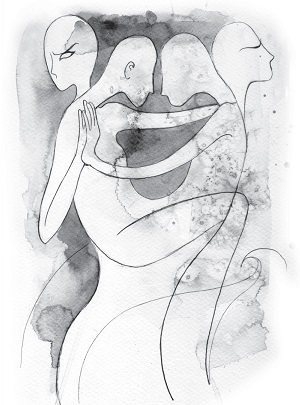 Needless to mention, two souls from different family, education, social and cultural background are brought together with elders’ consent and in many cases as personal choice and preference that, however, does not guarantee compatibility of their personal attributes, tastes, likings, and so on. Obviously, this mismatch often leads to mutual differences, arguments and conflicts that only mutual understanding, tolerance and acceptance can resolve to keep this bonding alive and kicking lifelong. Such paradoxes are so beautifully addressed in “compatibility”.
Needless to mention, two souls from different family, education, social and cultural background are brought together with elders’ consent and in many cases as personal choice and preference that, however, does not guarantee compatibility of their personal attributes, tastes, likings, and so on. Obviously, this mismatch often leads to mutual differences, arguments and conflicts that only mutual understanding, tolerance and acceptance can resolve to keep this bonding alive and kicking lifelong. Such paradoxes are so beautifully addressed in “compatibility”.
Hysterically they argued
Furious, she threatened
to plunge into the river
roaring in seasonal spateHe sought forgiveness
She calmed down
In one of the poems “Togetherness”, the poet tries to convey the significance of the institution like marriage and conjugal relationship as also the need of mutual understanding for a prolonged healthy and happy life sharing personal experience of nearly five decades.
I still remember
that blessed day…A desire arose, then,
to discover togetherness
that allows us to explore
every day, even today
Marriage, conjugal relationship and love are perhaps the most important aspect of the mundane and material life of the human species that most people are able to live and experience in whatever way, the Wanderer goes a step further to caution people by dramatically portraying nemesis of one such failed relationship in his verse “Mismatched”.
Incompatibility
made them fight,
he walked out… … …
Exhausted, aged
unfulfilled, jaded
and confused
now sitting in a
mountain cave, he
draws her paintings
The aforesaid nemesis does not need any explanation. It’s obvious that the quarrel and conflicts in human relationships only raise an invisible wall of dissatisfaction, misunderstanding and misery that is difficult to penetrate or demolish but the love between the beings is seldom lost, which only further escalate their sense of unfathomed longing and loss.
The humane aspect of the poet’s personality is visible in his musings in the poems like Coby, The Maple Tree and Tree of Life. Coby – the Chocolate Labrador was a pet at the workplace of the poet with whom he remained fondly attached for many years and even shared his food and gentle caress. The pet Labrador is no more but its longing and loss still haunt him.
Coby - our loveable Labrador
is no more …
I cannot help but notice
moistness in my eyes.
The poet’s liking and love towards the other animate and inanimate things is also visible from his sensitivity and sentiments towards the maple tree in his own backyard as reflected in the verse of the same name. With the onset of autumn, leaves of most the trees change their hue and colour, and eventually fall rendering the trunk and branches lone and deserted. This phenomenon is noticed everywhere but is more pronounced in the north-eastern parts of the United States. The poet seems to be deeply moved with this nemesis of a tree in his own backyard and this autumn effect metaphorically depicts vacillations of the poet’s own mind.
Does the autumn
triggering the leaves
to change…… … …
resemble
the echo of hullabaloo
sparked by the storm
of erratic thoughts
vacillating in my mind?
In the very Preface, the poet has himself admitted the anxieties caused by the tragedies, trauma and commotion during the pandemic of 2020. The Wanderer covers the genesis of many poems in the same environment with a churning of fleeting thoughts and this anthology is an attempt to find answers to some uncertainties and the complex questions arising therefrom. This dilemma and pain is clearly visible in the poems such as Disaster, Onus, New Era, Conflicts, Venal, Syndrome, Dementia, and so on. Through his musing in “New Era”, the poet sets the pace and in different verses he laments about the global cause and effect of the coronavirus and other tragedies on the humanity.
2020 has ushered a new era,
the invisible forces of Corona
bringing down the world to its knees
Needless to mention that this pandemic has forced even the most powerful and prosperous nations on knees. Many of them are simply clueless even after nearly one year of disaster how to tackle the invisible and ultramicroscopic enemy. Nearly two million people have died, economy of the nations is in shambles, and personal income and employment has dwindled globally. Two largest democracies of the world, the United States and Bharat (India), one by vintage and size and the other by population, respectively, occupy two topmost slots of the worst victim nations; incidentally, one of them is poet’s current abode and workplace while the other is the country of his origin.
The miseries and pain caused by the global pandemic on account of the Covid-19 is so well depicted in verses “Conflicts” and “Venal”. In Dementia, the poet recounts the dangers of the malfunctions of brain affecting the ability to think, remember and behave normally, simultaneously advising to follow Yam prescribed by Sage Patanjali in Yoga Sutras.
Finally, the poet with “Carefree”, unwinds revealing his own mind and heart when the Wanderer hints of going against the flow, the usual dictum being a secured life through compliance rather than going astray, bondage free to explore the labyrinth of life without caring or bothering about the destination.
Was the wanderer ever tied
with instructions this way?
Bondage free then and even now
he treads carefree all the way
To sum up, the Wanderer has a collection of precisely hundred poems ranging from philosophical, spiritual to various mundane aspects of human life. Nearly all poems read good, carrying and conveying specific idea and message through it. In a short review, it is not possible to individually highlight or analyse the text or embedded message of the individual poems but that does not undermine their individual relevance and significance. A majority of poems have been further augmented and illustrated through the commensurate pencil drawings. I must record my appreciation and felicitations to Ms. Niloufer Wadia, who has made a significant value addition to this anthology through her pictorial illustrations. I hope the Wanderer would invite a mass appeal and instant following bringing more laurel and success to the distinguished author-poet.
More on Wanderer
20-Feb-2021
More by : Dr. Jaipal Singh